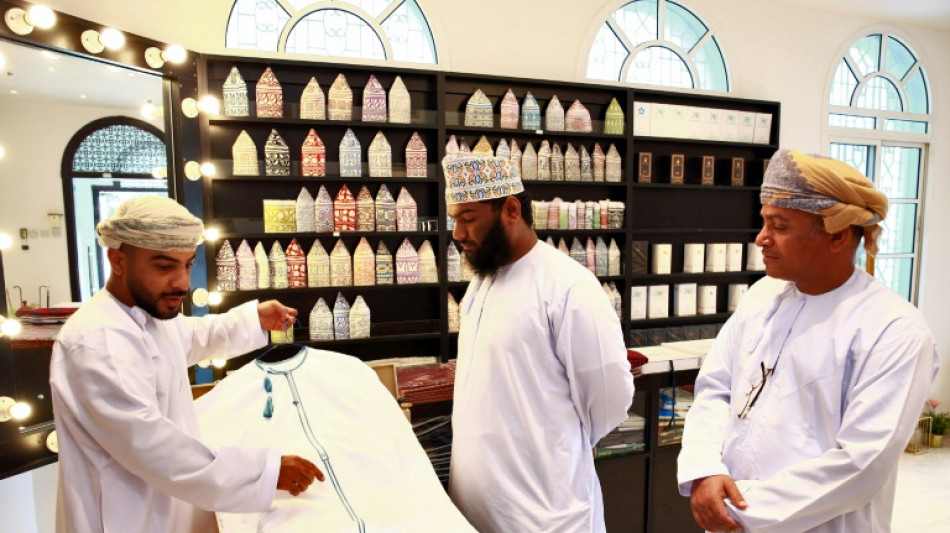
-
 Japan PM's tax giveaway roils markets and worries voters
Japan PM's tax giveaway roils markets and worries voters
-
Amid Ukraine war fallout, fearful Chechen women seek escape route

-
 Rybakina surges into Melbourne semis as Djokovic takes centre stage
Rybakina surges into Melbourne semis as Djokovic takes centre stage
-
Dollar struggles to recover from losses after Trump comments

-
 Greenland blues to Delhi red carpet: EU finds solace in India
Greenland blues to Delhi red carpet: EU finds solace in India
-
Will the EU ban social media for children in 2026?

-
 Netherlands faces 'test case' climate verdict over Caribbean island
Netherlands faces 'test case' climate verdict over Caribbean island
-
Rybakina stuns Swiatek to reach Australian Open semi-finals

-
 US ouster of Maduro nightmare scenario for Kim: N. Korean ex-diplomat
US ouster of Maduro nightmare scenario for Kim: N. Korean ex-diplomat
-
Svitolina credits mental health break for reaching Melbourne semis

-
 Japan's Olympic ice icons inspire new skating generation
Japan's Olympic ice icons inspire new skating generation
-
Safe nowhere: massacre at Mexico football field sows despair

-
 North Korea to soon unveil 'next-stage' nuclear plans, Kim says
North Korea to soon unveil 'next-stage' nuclear plans, Kim says
-
French ex-senator found guilty of drugging lawmaker

-
 US Fed set to pause rate cuts as it defies Trump pressure
US Fed set to pause rate cuts as it defies Trump pressure
-
Sleeping with one eye open: Venezuelans reel from US strikes

-
 Venezuela's acting president says US unfreezing sanctioned funds
Venezuela's acting president says US unfreezing sanctioned funds
-
KPop Demon Hunters star to open Women's Asian Cup

-
 Trump warns of 'bad things' if Republicans lose midterms
Trump warns of 'bad things' if Republicans lose midterms
-
Russian strikes in Ukraine kill 12, target passenger train

-
 With Maduro gone, Venezuelan opposition figure gets back to work
With Maduro gone, Venezuelan opposition figure gets back to work
-
Celebrities call for action against US immigration raids

-
 Rubio to warn Venezuela leader of Maduro's fate if defiant
Rubio to warn Venezuela leader of Maduro's fate if defiant
-
Denver QB Nix 'predisposed' to ankle injury says coach

-
 Lula, Macron push for stronger UN to face Trump 'Board of Peace'
Lula, Macron push for stronger UN to face Trump 'Board of Peace'
-
Prass stunner helps Hoffenheim go third, Leipzig held at Pauli

-
 Swiss Meillard wins final giant slalom before Olympics
Swiss Meillard wins final giant slalom before Olympics
-
CERN chief upbeat on funding for new particle collider

-
 Trump warns US to end support for Iraq if Maliki returns
Trump warns US to end support for Iraq if Maliki returns
-
Judge reopens sexual assault case against goth rocker Marilyn Manson

-
 South Korea's ex-first lady to learn verdict in corruption case
South Korea's ex-first lady to learn verdict in corruption case
-
Rosenior dismisses Chelsea exit for 'untouchable' Palmer

-
 Markram powers South Africa to win over West Indies
Markram powers South Africa to win over West Indies
-
Vladimir Padrino: Venezuela's military power broker

-
 Amazon closing Fresh and Go stores in Whole Foods push
Amazon closing Fresh and Go stores in Whole Foods push
-
Koepka nervous about game and fans in PGA Tour return

-
 Trump's Iowa trip on economy overshadowed by immigration row
Trump's Iowa trip on economy overshadowed by immigration row
-
Dortmund coach says Inter Milan are improved under Chivu

-
 US border chief in Minneapolis as Trump tries to calm crisis
US border chief in Minneapolis as Trump tries to calm crisis
-
What to know about America's colossal winter storm

-
 Iran warns against 'instability' after US strike group arrives
Iran warns against 'instability' after US strike group arrives
-
GM reports quarterly loss but boosts shareholder returns

-
 US banks fight crypto's push into Main Street
US banks fight crypto's push into Main Street
-
NFL Bills make offensive coordinator Brady new head coach

-
 TikTok settles hours before landmark social media addiction trial
TikTok settles hours before landmark social media addiction trial
-
Newcastle braced for 'ultimate test' against PSG after storm disruption

-
 Brook blitz ends Sri Lanka's unbeaten home run, England clinch series
Brook blitz ends Sri Lanka's unbeaten home run, England clinch series
-
LVMH 2025 net profit drops 13% to 10.9 bn euros

-
 Philip Glass pulls Kennedy Center premiere after Trump takeover
Philip Glass pulls Kennedy Center premiere after Trump takeover
-
Slot says Liverpool must fix 'very bad cocktail'


Dishdasha crackdown as Omani men face fines for rogue robes
A wave of foreign imitations and alternative styles has prompted Oman to take tough action to preserve its unique national dress, threatening thousands of dollars in fines for men who wear the wrong sort of dishdasha.
Dishdashas, the long, elegant robes that are a hallmark of the Gulf sultanate, have fallen prey to rising hemlines and elaborate embroidery, with some wearers also going for multicoloured designs.
The ministry of commerce and industry said the dishdasha's design is based on "certain criteria", stipulating it should be made mostly out of cotton with embroidery only on the collar, front slit and cuffs.
"The fabric must be a single colour," a ministry official told AFP, adding that white or neutral colours were preferred.
A person or manufacturer caught violating the dress code will be fined 1,000 Omani rials ($2,600), or double that in the case of a second violation.
While similar to the ankle-length robes worn by men in neighbouring countries, Oman's dishdasha stands out with its subtle embroidery around the neckline (mahar) which continues down a front central slit (shaq) over the chest.
In other Gulf countries, including Saudi Arabia and the United Arab Emirates, the long-sleeved robe is usually plain white and worn with either a white keffiyeh headdress or a red and white chequered one.
Omani men usually wear an embroidered brimless round cap (kumma) or a turban-style headdress, known as the massar, to complete their look.
The striking ensemble is a distinctive part of life in Oman, an ancient land known for its rich heritage, scenic coasts and stunning mountains.
- 'Personal freedoms' -
In a conservative country where criticism of the authorities is rare, some in the capital Muscat said while the recent announcement could be considered an infringement on personal freedoms, they understood the need to preserve national identity.
"The decision may be good to set certain standards but conflicts with personal freedoms," said Ouahib al-Jadidi, a 36-year-old entrepreneur.
"There are men who want to wear dishdashas that match their own tastes, but this ruling will prevent them from doing so."
Nabegh al-Qarni, who owns a store that sells dishdashas and accessories for men, said modifications to the traditional dress had become noticeable.
"Among the most notable changes is the shortening of the robe or larger patterns and embroidery," the 35-year-old told AFP.
"We have also seen different colours of dishdasha, instead of the traditional white, brown or black," he said, adding that Omani society, especially the older generation, is averse to this kind of change.
The effort to preserve Omani culture in the face of evolving tastes comes as the country grapples with social and economic change, introducing measures to attract foreign investment as it attempts to reduce its reliance on oil.
These have included developing its tourism industry, as well as issuing long-term residence permits for foreigners -- who make up 40 percent of its 4.5 million population -- while reserving certain jobs for citizens.
Omani economist Khalfan al-Touqi said the dishdasha was not only symbolic of the people and their heritage but also had "great economic importance".
"Recently, many shopkeepers have been bringing in dishdashas from abroad, from China and India, which often alter the robe," he said, adding the new measures also aim to encourage retailers to buy from local factories.
M.Furrer--BTB

